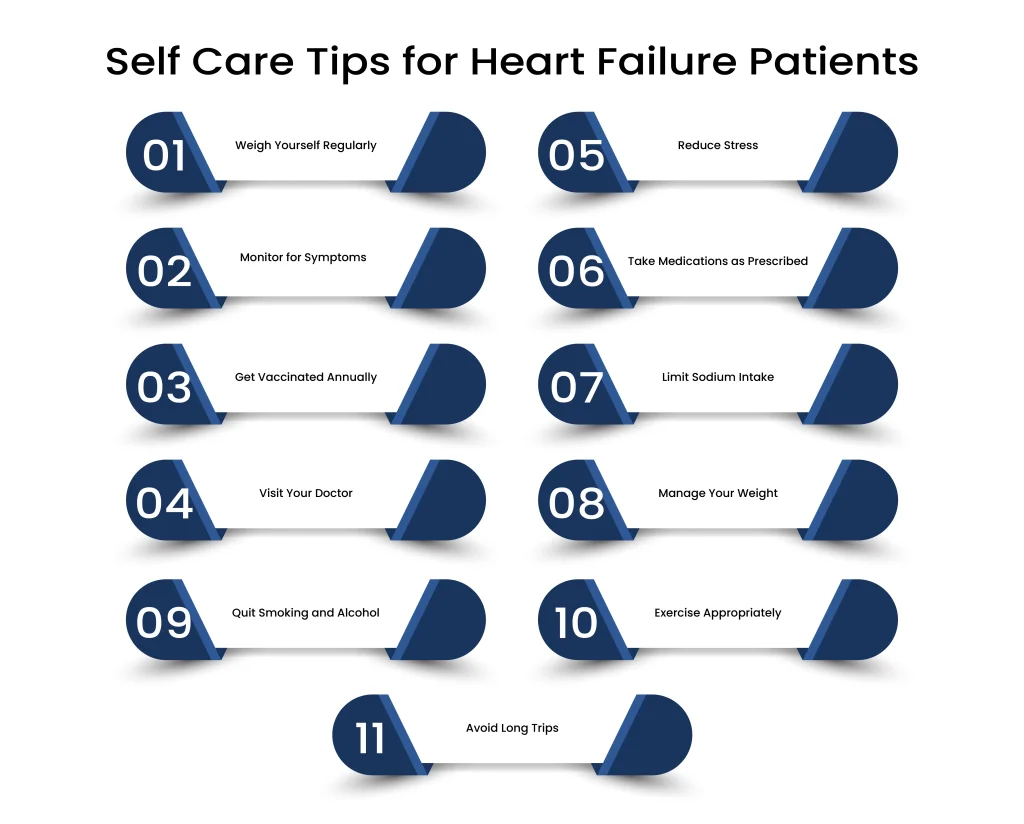If you’re among the nearly six million Americans living with heart failure, you’re facing a reality that’s all too common—and one that’s expected to become even more widespread, with cases predicted to rise by 46 percent by 2030. But while heart failure is a serious condition, it doesn’t have to control your life.
The key to managing heart failure effectively lies in self-care. Did you know that by developing strong self-management skills, you could reduce your risk of heart failure-related hospitalization by 20 percent? That’s a significant impact—one that puts the power back in your hands.
In this post, we’ll explore essential self-care habits that can help you take charge of your heart health. Whether you’re new to the diagnosis or have been living with it for some time, these practical tips will help you navigate your journey with confidence and a sense of control.
Recognizing Symptom Is Your First Line of Defense Against Heart Failure
When it comes to heart failure, your best defense is early detection. The sooner you recognize the symptoms, the better equipped you’ll be to manage the condition and prevent it from worsening. Symptoms like shortness of breath, fatigue, swelling in your legs, or sudden weight gain are your body’s way of signaling that something isn’t right. By paying close attention to these warning signs and acting quickly, you can take control of your heart health before the situation escalates.
Recognizing these symptoms isn’t just about identifying what’s happening now; it’s about setting the stage for more effective management of your heart failure in the long term. The earlier you catch these signs, the sooner you can work with your healthcare provider to adjust your treatment plan, potentially avoiding more serious complications down the road. This awareness is your first and most crucial line of defense in living a healthier, more stable life with heart failure.
Medication Adherence
Taking your medications as prescribed isn’t just a routine—it’s a vital part of managing heart failure. Medications play a critical role in controlling symptoms, improving your heart function, and preventing your condition from worsening. Skipping doses or not following your treatment plan can lead to serious consequences, including increased hospitalizations or even life-threatening complications.
Adhering to your medication regimen means taking the right dose at the right time, every day. It might seem straightforward, but it’s easy to forget or fall out of routine, especially when you’re feeling better. However, consistency is key. By staying committed to your medication plan, you’re giving your heart the best chance to function optimally and reduce the risks associated with heart failure.
Reduce Sodium Intake
When you’re living with heart failure, one of the most important dietary changes you can make is limiting your salt intake. Excess sodium causes your body to retain water, which can increase your blood pressure and put extra strain on your heart—a situation you definitely want to avoid.
Cutting back on salt isn’t just about what you add to your food; it’s also about being mindful of the hidden sodium in processed foods, canned goods, and restaurant meals. By reducing your sodium intake, you can help manage fluid buildup in your body, ease the workload on your heart, and ultimately prevent your symptoms from worsening.

It may take some time to adjust, but learning to flavor your meals with herbs, spices, and other salt-free seasonings can make a huge difference in your heart health. Your taste buds will adapt, and your heart will thank you for it. Reducing your salt consumption is a simple but powerful step towards better managing your heart failure and improving your overall quality of life.
Daily Exercising
Incorporating daily exercise into your routine is one of the most effective ways to support your heart health when living with heart failure. Regular physical activity helps strengthen your heart muscle, improve circulation, and increase your overall energy levels. It’s not just about keeping your body in shape; it’s about enhancing your quality of life and managing your symptoms more effectively.
You don’t need to engage in intense workouts to reap the benefits. Simple activities like walking, cycling, or even gentle stretching can make a significant difference. The key is consistency—aim for at least 30 minutes of moderate exercise most days of the week. Start slowly and gradually increase your activity level as your endurance improves.
Before beginning any exercise routine, it’s crucial to consult with your healthcare provider to ensure your chosen activities are safe for you. You can create a personalized exercise plan that fits your needs and capabilities with their guidance. By making daily exercise a habit, you’ll help strengthen your heart, boost your mood, reduce stress, and enhance your overall well-being.
Maintain a Daily Log
Keeping a daily log is a simple yet powerful tool in managing heart failure. By recording your symptoms, weight, blood pressure, medications, and daily activities, you create a clear picture of your health that can help you and your healthcare provider monitor your condition more effectively.
A daily log allows you to spot trends and changes early, such as unexpected weight gain or increased fatigue, which might indicate fluid retention or worsening heart failure. Noticing these patterns can lead to timely adjustments in your treatment plan, helping you avoid potential complications.
Additionally, documenting your medication adherence, diet, and exercise routines provides insight into how well you’re following your self-care plan. It can also serve as a helpful reminder and a way to stay accountable to your health goals.
Limit Tobacco, Alcohol, & Other Harmful Substances
.When living with heart failure, it’s crucial to minimize or eliminate your use of tobacco, alcohol, and other harmful substances. These habits can have a severe impact on your heart health, exacerbating your condition and increasing the risk of complications.
Tobacco is particularly dangerous because it damages your blood vessels, raises your blood pressure, and reduces the oxygen your heart receives. Quitting smoking is one of the most important steps you can take to improve your heart function and overall health. Even if you’ve smoked for years, stopping now can make a significant difference.
Alcohol can also pose risks, especially in excessive amounts. It can weaken your heart muscle, lead to irregular heartbeats, and interfere with your medications. While some people may be able to consume alcohol in moderation, it’s essential to discuss with your healthcare provider what’s safe for you. In many cases, limiting or completely avoiding alcohol is the best option.
Finally, other substances, including recreational drugs and certain over-the-counter medications, can put additional strain on your heart or interact negatively with your prescribed treatments. Always consult with your doctor before taking any new medication or supplement.
Prevent heart problems before they start – Schedule a preventive checkup
Contact UsRegular Check-Ups with Your Doctor
Routine visits to your doctor are a critical part of managing heart failure effectively. Regular check-ups allow your healthcare provider to monitor your condition closely, adjust your treatment plan as needed, and catch potential issues before they become serious problems.
During these visits, your doctor can evaluate your heart function, review your symptoms, and assess how well your current medications are working. They can also provide valuable guidance on your lifestyle habits, answer any questions you might have, and help you stay on track with your self-care plan.
Even if you’re feeling well, don’t skip these appointments. Heart failure is a dynamic condition that can change over time, and staying in regular contact with your healthcare team is essential to adapting your care as needed. These check-ups are an opportunity to stay proactive about your health, ensuring that you’re doing everything possible to keep your heart functioning at its best.
Words By Author
Managing heart failure is challenging, but with the right self-care habits, you can significantly improve your quality of life. Simple actions like recognizing symptoms early, taking your medications consistently, limiting harmful substances, and keeping a daily health log all contribute to better heart health. Regular exercise and routine check-ups with your doctor are also crucial in maintaining a strong heart.
If managing your symptoms feels overwhelming, you don’t have to do it alone. The Atlantic Cardiovascular Clinic offers expert support and personalized care to help you take control of your heart health. Reach out to us today to get the guidance and treatment you need to live your best life with heart failure.







